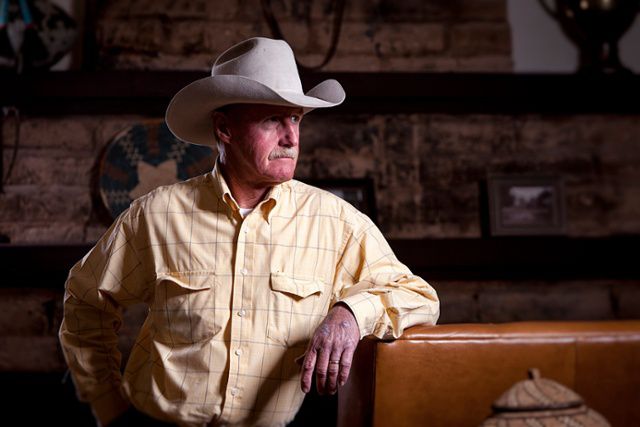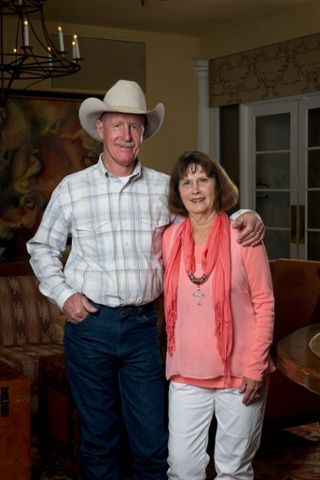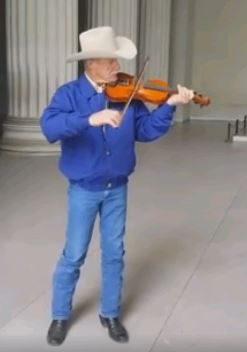Meet Arizona Agriculture's Jim Parks
Published
4/26/2016
By Lauren Scott, Arizona Farm Bureau Intern with contributions by Julie Murphree, Arizona Farm Bureau Communication Director: Jim Parks has been an Arizona rancher for 40 years, and his family has been in the cattle business for so many generations you need both hands to count it out. Though he possesses a calm and gentle demeanor, he’s a fighter. It’s that mix of Welsh, Native American and Spanish blood that courses through his veins.
And what he fights for is what you and I need him to fight for, the land and agriculture. One of his more recent battles has to do with the Grand Canyon Watershed National Monument in northern Arizona.
“As I make my living off the land, be assured that I respect efforts to ensure its health and vibrancy, not just now but into the future,” Parks said in a statement to the press and in testimony. “It’s because of my respect and admiration for this land that I emphatically oppose any unilateral executive order that would lead to the creation of the Grand Canyon Watershed National Monument.”

Jim Parks
He’s one to take the battle head on and even addressed one of our Congresswoman on the national monument issue. “U.S. Rep. Ann Kirkpatrick recently wrote: ‘Some Arizonans are worried a monument designation would curtail cattle grazing, hunting or other recreational use of these lands. That’s why I want folks to know that none of these activities are automatically prohibited by a national monument designation’ (“A Grand Canyon Watershed National Monument can work for everyone,” Eastern Arizona Courier, April 4). While quite true, the one word she uses that troubles me is ‘automatically.’”
Parks went on to say, “Consider what has taken place at two of the state’s other national monuments, Walnut Canyon and Wupatki. Walnut Canyon’s acreage was expanded in 1996 and subsequently was closed to grazing. Wupatki, created in 1924, was closed to grazing in 1980, affecting the Babbitt Ranches and rancher Jim Shiew. While activities such as grazing within a national monument are not ‘automatically’ prohibited, history would indicate that, at some point, our livelihood as ranchers will be compromised. With cooperation between the Bureau of Land Management, U.S. Forest Service and other entities, grazing
Parks has also taken on the wolf issue. You can imagine where he stands on this one. As a rancher and a cowboy, he knows the depredation a wolf population savagely applies to a cattle herd.
As a Flagstaff resident and member of the Arizona Farm Bureau’s board of directors, Parks has served as Coconino County Farm Bureau’s President for several years. He won’t back away from a worthy fight and when you read his background you’ll understand why.

Jim and Vickie Parks stay involved in their community and have always been involved in Farm Bureau.
Tell us about your farm or agricultural operation. To explain this, I need to tell my family history. My family history started in Arizona in about 1720. My ancestors came over from Spain, and they came up through Mexico into the Tucson area. My great great great great grandfather had a contract with the Roman Catholic Church to paint some of the paintings in the San Xavier Mission. They started out there, but before that, and I guess after that too, they were in Tubac, which at that time was the first settlement in Arizona. Tubac and Tumacacori and the San Xavier Mission. Being on a mission, they eventually got to Tucson. The Spaniards didn’t bring women with them, so they married some of the local Indian women. I have Indian blood from the Tohono O’odham. That’s where my family got their start.
On the other side of the family, my great great grandfather, Sam, emigrated from Wales in the 1830s or 40s. He was 11 years old when he came to America with his family, landing in New York City. When they got to New York, the parents told the two oldest boys, one of which was my great great grandfather, that they would have to go make their own way because they had no way to support them. In those days the Welsh spoke Welsh, they didn’t speak English. He got his first job in a textile factory as a laborer. From there he went west and wound up in St. Louis.
He got a job on a steamboat when he was 14 or 15. The steamboat was owned by Henry Clay, who was a big politician back then. Henry Clay told him that he should go to the gold fields. You might recall the California Gold Rush of 1849 from history books. So, he took his wages from the steamboat company and bought a horse and headed west. He wasn’t much of a miner, but he was a pretty good shot with a rifle. He was killing wild game, cutting it up and selling it to the miners. When the game started running short, he started buying cattle from a local ranch with Spanish ranchers. He was buying cattle from the ranchers and running his butcher shop.
Eventually, Grandpa Sam came down with tuberculosis. He and his two friends decided they were going to return to New York to see their families. They knew the gold that they had gathered up would help their families. But, Grandpa Sam was very sick with this tuberculosis, almost dying several times on the trip, crossing the country on horseback. They were going the southern route because it was cooling off for winter. He hemorrhaged really badly in Yuma, and he had to stay there a few days to heal up. They got to Maricopa Wells, and he hemorrhaged again, waiting a week or so for him to heal. They then went to Tucson, and it happened again. By now he was so weak that they figured he was going to die. So he left enough of his gold with another Anglo in town to bury him, and his friends headed back east.
By the time his friends got back to his family, they gave them his gold, but they said that Sam had died, certain that he had not survived. His family bought a farm in upstate New York with the gold.
In the meantime, Sam is in Tucson survives
If you’re ever in Tucson and you’re driving down Mable Street, that’s named after my aunt Mable. Another great-grandfather, a cowboy that came from Texas, was on the city council and they were drawing what might be the future of Tucson. The guys on the city council were picking the names for the streets, and they never thought Tucson would get any bigger than what it was, naming streets after their children and their dogs. The only one that’s really survived is the street that is named after my aunt Mable. She lived to be 102 years old; I knew her. She was still alive when I was young.
Anyway, my family has been involved in agriculture since the very beginning.
My mother was from the line that I just spoke about, and she was born and raised in Winslow, Arizona. When my grandmother got to be college age, she was the first one of our family to ever go to college. She came up here to Flagstaff and went to what was then a state teachers college. There were a lot of teachers colleges in those days. My grandfather was from Idaho, and he was a watchmaker. They lived in Winslow and had a store there.
She and my father got married right after the beginning of World War II, right after Pearl Harbor. He was a pilot in the United States Army Air Corps [the military aviation arm of the United States of America between 1926 and 1941]. So they got married and lived in Glendale. They bought some land, which after the war, they developed into a farm. That’s where I was born. My father then got out of production agriculture, because he was still flying, and he was still instructing the Air Force.
I went into the Navy in 1970 during the Vietnam War. When I got out I didn’t want anything to do with the heat down in the Valley anymore, so I came up here to the mountains. I tried college and I didn’t like it so I started punching cows, and I did that for 40 years.
I’m now just a semi-retired old guy. I retired and then I went back to work later on. I retired in 2012, but I went back to work in 2014. I had 400 head of heifers up near the Grand Canyon. That was a pretty good old man’s job. I finally retired in the first month or so of 2015. Now I just do some things here and there, like today. Today I just got back from Buckeye. My neighbor has a feed store, and he needed someone to help him haul the hay back here to Flagstaff.
What changes have you seen in your lifetime as it relates to farming and/or ranching? Well, my father was a farmer, and he was farming with those tractors with no cab, and they weren’t as powerful as the ones today. They didn’t have GPS, and if you made a straight row it’s because you had a straight eye. He was also a crop-duster pilot, an industry that’s gone through dramatic change. We have biotech, or GMO, crops that have dramatically helped improve environmental and yield factors. I think technology is the most profound thing that has happened. Not just for farming, but for ranching too.
In the ranching industry, most of us, not all of us, but most of us still use horses. There are a few people who use four-wheelers. A lot of the new technology is very necessary. Medicines and vaccines and things like that have improved so much in the last 25 to 30 years. It’s pretty amazing how the veterinary end of our industry works. There is stuff out there that I’ve given to a sick calf who was going to die within the hour and he lived and made it to market.
Today, the ranching business has the opportunity to introduce drone (or unmanned aircraft) into the management of the business.
How will the next generation of farmers and ranchers have to operate? Technology keeps marching on. There’s no reason to stop it, and there is no way you can stop it. There are going to be things in agriculture in the future that will totally amaze those of us who are in it now. There are going to be things that are invented in the future that will totally revolutionize the way we think now. The young people are going to have to accept new technology. It will make their lives easier, and make their work days easier.
Will anyone in your family – younger generation – go into farming and/or ranching? I have two daughters and I have one niece, and none of my grandchildren have gone into agriculture. None of them wanted to do that. I have a grandson who is three, but he hasn’t made a decision yet. We’ll see!
What community activities are you/were you involved in? One of the biggest things I was involved in was Farm Bureau, also Cattle Growers. I was president of the Coconino County Farm Bureau and Cattle Growers. I was vice president of the Coconino County NRCD board, and I’m going to run for County Supervisor this year.
Why are you a farm bureau member? Farm bureau is absolutely important to agriculture. There are forces in this country now that are against traditional farmers and ranchers. They are trying to shut us down. Agriculture needs this advocacy because there are not a lot of people in agriculture anymore. We are less than 2% of the population and we have to feed the whole of the United States and a good portion of the world. As people continue to leave it’s going to be more important to have advocacy. Most of the people out there in these big cities don’t realize where their food comes from.
Education is core to Farm Bureau. If we don’t get the information out to the public, farming and ranching will die. Then where are we going to get our food from?
What is one fact that no one knows about you? A lot of people in Farm Bureau know this, but I’ve been learning to play the violin for about three years now. At the last Annual Meeting of Arizona Farm

Besides playing the National Anthem during Arizona Farm Bureau's Annual Meeting last year, Parks played it at the Lincoln Memorial in February during the spring Arizona Farm Bureau delegation Washington D.C.
What is something you think you do really well? I think I fly an airplane really well.
What is the best business advice you have ever given or been given? The best advice I was ever given was to pick a course of action and stick with